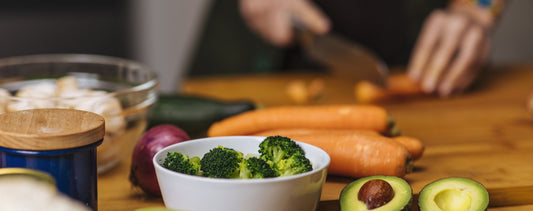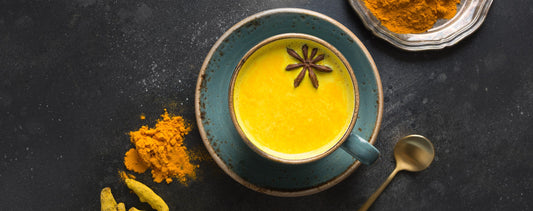“When diet is wrong, medicine is of no use. When diet is correct, medicine is of no need.”—Ayurvedic proverb
It’s hard not to notice the books, documentaries, and podcasts that present research on the association between diet and chronic disease or illness. Emotional well-being is also affected by diet, something that can be overlooked when seeking treatment for mental health issues. Start today with a preventive approach to your health. Begin by considering the importance of food and its potential for healing.
Medication has its value, but if you could choose food over modern medicine, wouldn’t you? Think of it this way: food is medicine. Food is nature’s medicine—without any side effects. Of course, there are other factors that add up to good health, such as good sleep, managing stress, and exercise, but diet is the foundation upon which you can build and is something you can usually control.
Using food as medicine starts by changing your approach to food from that of restriction to introduction—of an abundance of the right foods. Take on the role of a scientist and become an expert on the study of your own body and find out what makes it tick. Health-conscious people start off by taking an interest in the role good nourishment can play, and because of the positive outcomes in both general well-being and with specific health issues, they end up sticking to their new healthy eating habits.
Healthy food is an important part of your life and there are plenty of ideas and concepts swirling around about what is good for you. Ayurveda, the ancient medical system of India, honors real food and a healthy diet as a vital contribution towards sustaining good health. The versatility of Ayurvedic principles provide insight into how and why changing one’s food habits can have such a huge effect on your health and well-being.
The following recommendations are influenced by Ayurvedic concepts to help introduce you to a world where it’s possible to feel healthy and happy on a daily basis thanks to the healing foods you eat.
According to Ayurveda, foods that are raw, fresh, locally sourced, and organic contain high amounts of prana, or vital life force, which animates all living beings. When you eat high pranic foods, you take in some of the natural healing intelligence of that food. The more you explore plant-based nutrition and eating healthy, the more you will discover the thread always leads back to eating a diet that is full of whole foods or foods that look close to how they grew in nature.
Human ingenuity mixed with technology has turned foods into something that may appear unrecognizable from its original form. These “new and improved” foods can be processed to taste delicious (generally by increasing an item’s sugar, fat, and salt content), making you want to eat even more of them. This doesn’t have to mean you must completely avoid processed foods, but start to be more conscious of your choices. Something to keep in mind is an apt quote by poet and playwright, Oscar Wilde – “Everything in moderation, including moderation.”
A good rule of thumb is to focus your grocery shopping around the perimeter of the store since this is where the fresh foods are usually kept. Be adventurous and try a vegetable you’ve never heard of. There are packaged foods that can be nutritious as well and are helpful when you don’t have time to cook. Just be sure to do your research. Seek out whole grains as much as possible, and avoid white flour and sugars. You should be familiar with the ingredients listed on a package. The fewer the number of ingredients, the better. Keep it simple.
Try This:
The heart of Ayurveda is the concept of three dynamic principles governing the body, mind, and consciousness. These principles are called doshas (Vata, Pitta, Kapha), and you have a combination of these doshas in your makeup. Understanding your expression of the doshas is the clue or map to discovering foods and a lifestyle that will balance you. This is the reason why the raw foods your friend eats may not work for you, perhaps causing gas and bloating instead. You may need to do a bit of experimenting to see what works for you.
Try This:
“Superfoods” are one of the latest fads. These nutrient-dense foods are promoted as being able to ward off disease and improve health and vitality.
Simply speaking, the best way to think about foods is that all whole foods are superfoods. Be sure to include variety in your diet in order to partake in all of Mother Nature’s healing gifts. The following is a list of a few foods considered in Ayurveda to be especially sattvic, or pure and life-giving.
Try This:
Understandably, your life is busy and it’s not always possible to focus on mindful, relaxed eating, but knowing that it might be helpful is a step in the right direction. A visit to a country like Italy will soon have you appreciating the pure enjoyment of eating good food and the community it encourages. Humans have naturally gathered over food for centuries. Food does more than provide you with fuel—it also offers opportunities to connect with loved ones and appreciate what you have. This is powerful medicine.
Try This:
Consider doing a cleanse to help you recognize your baseline—your place of true balance. You will know when you have reached this place because your digestion will be strong, your energy will increase, creativity will flow, and you will experience more joy, and other benefits. There are many cleansing programs available and depending on your doshic constitution, some will be better for you than others. Ayurveda places great importance on cleansing, especially with the changing of the seasons. It’s a time to reset and allow your body and mind to integrate and function from a higher state of being rather than coasting along through life.
It is from a place of balance that you will make better food choices. It becomes easier to detect when something isn’t vibing with you and you need to take a break from that food, at least for a time. In the past, perhaps you didn’t think twice about eating that cupcake. But now, having experienced what it feels like to thrive, you’d rather avoid the sugar coma that you experience. Become an expert on the foods that make you feel good.
Try This:
*Editor’s Note: The information in this article is intended for your educational use only; does not necessarily reflect the opinions of the Chopra Center's Mind-Body Medical Group; and is not a substitute for professional medical advice, diagnosis, or treatment. Always seek the advice of your physician or other qualified health providers with any questions you may have regarding a medical condition and before undertaking any diet, supplement, fitness, or other health program.
Learn how to use natural wellness practices like meditation, yoga, and Ayurvedic eating to help you slow, and even reverse, the aging process at Perfect Health, our intimate, personalized mind-body healing retreat. Learn More.
It’s hard not to notice the books, documentaries, and podcasts that present research on the association between diet and chronic disease or illness. Emotional well-being is also affected by diet, something that can be overlooked when seeking treatment for mental health issues. Start today with a preventive approach to your health. Begin by considering the importance of food and its potential for healing.
Medication has its value, but if you could choose food over modern medicine, wouldn’t you? Think of it this way: food is medicine. Food is nature’s medicine—without any side effects. Of course, there are other factors that add up to good health, such as good sleep, managing stress, and exercise, but diet is the foundation upon which you can build and is something you can usually control.
Using food as medicine starts by changing your approach to food from that of restriction to introduction—of an abundance of the right foods. Take on the role of a scientist and become an expert on the study of your own body and find out what makes it tick. Health-conscious people start off by taking an interest in the role good nourishment can play, and because of the positive outcomes in both general well-being and with specific health issues, they end up sticking to their new healthy eating habits.
Healthy food is an important part of your life and there are plenty of ideas and concepts swirling around about what is good for you. Ayurveda, the ancient medical system of India, honors real food and a healthy diet as a vital contribution towards sustaining good health. The versatility of Ayurvedic principles provide insight into how and why changing one’s food habits can have such a huge effect on your health and well-being.
The following recommendations are influenced by Ayurvedic concepts to help introduce you to a world where it’s possible to feel healthy and happy on a daily basis thanks to the healing foods you eat.
1. Eat Naturally Intelligent Foods
Modern food is significantly different from what your hunter-gatherer ancestors ate. The ancestral diet was made up of wild grasses, seeds and nuts, vegetables, fruits, and wild game. This provided everything people needed in ancient times. In addition, they were limited by what was available in their environment in any given season because food wasn’t shipped or preserved as it is today. The advantage to eating this type of diet was that food was consumed close to the source, pure and unmodified for the most part, thus retaining “natural intelligence” in the form of fiber, vitamins, minerals, and healthy fats. Fortunately, we have easier access to food, but the general concept of food source is still very relevant. The more we take into our body food closest to its original form, the more we can access nature’s intelligence and turn it into the medicine we need for healthful living.According to Ayurveda, foods that are raw, fresh, locally sourced, and organic contain high amounts of prana, or vital life force, which animates all living beings. When you eat high pranic foods, you take in some of the natural healing intelligence of that food. The more you explore plant-based nutrition and eating healthy, the more you will discover the thread always leads back to eating a diet that is full of whole foods or foods that look close to how they grew in nature.
Human ingenuity mixed with technology has turned foods into something that may appear unrecognizable from its original form. These “new and improved” foods can be processed to taste delicious (generally by increasing an item’s sugar, fat, and salt content), making you want to eat even more of them. This doesn’t have to mean you must completely avoid processed foods, but start to be more conscious of your choices. Something to keep in mind is an apt quote by poet and playwright, Oscar Wilde – “Everything in moderation, including moderation.”
A good rule of thumb is to focus your grocery shopping around the perimeter of the store since this is where the fresh foods are usually kept. Be adventurous and try a vegetable you’ve never heard of. There are packaged foods that can be nutritious as well and are helpful when you don’t have time to cook. Just be sure to do your research. Seek out whole grains as much as possible, and avoid white flour and sugars. You should be familiar with the ingredients listed on a package. The fewer the number of ingredients, the better. Keep it simple.
Try This:
- Choose fruits and vegetables that are in season.
- Support local growers (visit your farmers market).
- Plant a garden.
2. Eat Foods According to Your Dosha Type
A popular Ayurvedic expression states, “If digestion is strong, we can turn poison into nectar, but if digestion is weak, we can turn nectar into poison.” It’s possible to eat the most nutritious and healing foods and still feel unwell. If food is medicine, why is this? A key concept in Ayurveda is the ability to extract proper energy and information from the foods we eat and convert it into biological intelligence. This is the foundation of good health and is referred to as agni or digestive fire. When you are unable to digest properly, food gets stuck or moves through you without any healing benefit. If you are going to try to change your diet for the better, be sure you are able to digest the foods properly.The heart of Ayurveda is the concept of three dynamic principles governing the body, mind, and consciousness. These principles are called doshas (Vata, Pitta, Kapha), and you have a combination of these doshas in your makeup. Understanding your expression of the doshas is the clue or map to discovering foods and a lifestyle that will balance you. This is the reason why the raw foods your friend eats may not work for you, perhaps causing gas and bloating instead. You may need to do a bit of experimenting to see what works for you.
Try This:
- Read Deepak Chopra’s book Perfect Health.
- Take this Chopra Center quiz to learn your dosha type.
3. Seek Out Medicinal Foods
In An Inflammation Nation, integrative medicine expert Sunil Pai, M.D., discusses in great detail the role of inflammation in disease. He states, “If you want to live a long and healthy life, you must keep your inflammation as low as possible.” If you are following an Ayurvedic diet according to your doshic makeup, most likely you are already eating in accordance with an anti-inflammatory diet.“Superfoods” are one of the latest fads. These nutrient-dense foods are promoted as being able to ward off disease and improve health and vitality.
Simply speaking, the best way to think about foods is that all whole foods are superfoods. Be sure to include variety in your diet in order to partake in all of Mother Nature’s healing gifts. The following is a list of a few foods considered in Ayurveda to be especially sattvic, or pure and life-giving.
-
Ginger (fresh or dried into powder): Excellent digestive aid with numerous health benefits including helping to reduce inflammation
-
Turmeric: Powerful medicinal spice that helps to balance the whole person, physically and mentally. Anti-inflammatory benefits.
-
Ghee: Alternative to regular butter that can help improve digestion
-
Legumes: Highly nutritious and versatile. Good source of antioxidants. Try soaking, sprouting, or using spices to enhance digestibility.
- Raw nuts, seeds, oils: Full of nutrients, antioxidants, and help promote a healthy cardiovascular system. Soaking nuts and seeds overnight will enhance digestibility. Oils lubricate the digestive tract, improving digestion.
- Honey: An excellent alternative to sugar, honey boosts immunity and increases energy. Avoid cooking with honey as heat decreases the nutritional benefits and may cause deleterious effects.
Try This:
- Select one fresh, whole food item to try for one week. Do some research on its benefits and discover meals and recipes for including the food in your diet. Notice if you feel any differences mentally or physically after eating this food.
4. Cultivate Mindful Eating Habits
In addition to paying attention to what you consume, it’s also important to note that how you eat also affects food’s medicinal effects. Have you ever tried eating after a heated discussion? It’s not the most pleasant experience. It takes a lot of energy for the mind and body to calm down—low on your body’s priority list is eating and digesting food. This is why it’s important to be conscious of the environment you are in and take steps to create a settled space during mealtime.Understandably, your life is busy and it’s not always possible to focus on mindful, relaxed eating, but knowing that it might be helpful is a step in the right direction. A visit to a country like Italy will soon have you appreciating the pure enjoyment of eating good food and the community it encourages. Humans have naturally gathered over food for centuries. Food does more than provide you with fuel—it also offers opportunities to connect with loved ones and appreciate what you have. This is powerful medicine.
Try This:
- Name three things you are grateful for before eating.
- Take time to enjoy and savor the foods you eat.
- Follow Body Intelligence Techniques for mindful eating.
5. Become an Expert on You
Just because something is known for providing certain benefits doesn’t necessarily mean it will do the same for you. You are unique and it’s essential to be patient and flexible when on this journey. As a result, it’s important to get to know yourself and rely on your gut (pun intended) when it comes to determining what you need.Consider doing a cleanse to help you recognize your baseline—your place of true balance. You will know when you have reached this place because your digestion will be strong, your energy will increase, creativity will flow, and you will experience more joy, and other benefits. There are many cleansing programs available and depending on your doshic constitution, some will be better for you than others. Ayurveda places great importance on cleansing, especially with the changing of the seasons. It’s a time to reset and allow your body and mind to integrate and function from a higher state of being rather than coasting along through life.
It is from a place of balance that you will make better food choices. It becomes easier to detect when something isn’t vibing with you and you need to take a break from that food, at least for a time. In the past, perhaps you didn’t think twice about eating that cupcake. But now, having experienced what it feels like to thrive, you’d rather avoid the sugar coma that you experience. Become an expert on the foods that make you feel good.
Try This:
- Attend a Perfect Health Retreat.
- Keep a food journal and be sure to note how you feel (mentally and physically) after you eat.
*Editor’s Note: The information in this article is intended for your educational use only; does not necessarily reflect the opinions of the Chopra Center's Mind-Body Medical Group; and is not a substitute for professional medical advice, diagnosis, or treatment. Always seek the advice of your physician or other qualified health providers with any questions you may have regarding a medical condition and before undertaking any diet, supplement, fitness, or other health program.
Learn how to use natural wellness practices like meditation, yoga, and Ayurvedic eating to help you slow, and even reverse, the aging process at Perfect Health, our intimate, personalized mind-body healing retreat. Learn More.






















